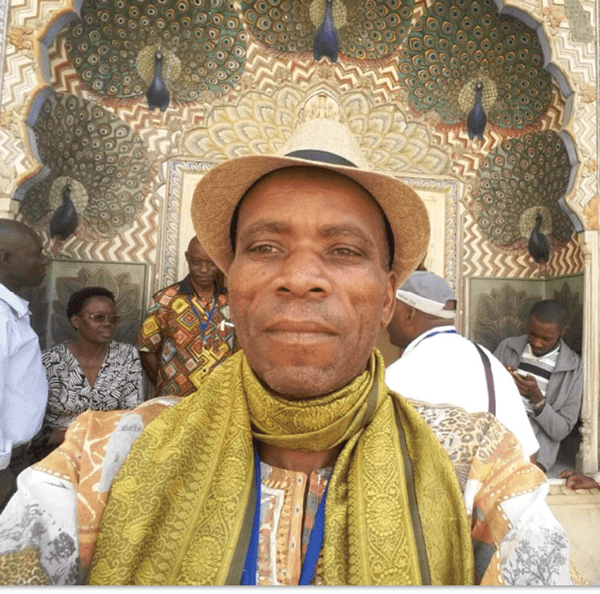
BY PHYLLIS MBANJE
THE enigma of Friday Chisanyu just won’t fade away. Founder of the Zimbabwe National Practitioners Association and board chairperson for the Traditional Medicines Practices Council (TMPC), the man is passionate about health and has dedicated his life to ensure that traditional medicines are recognised and earn their rightful place alongside modern medicine.
“I started this healing business way back in primary school and it’s been 38 years now,” he told NewsDay Weekender in a recent interview.
Easy going and quite amiable, Chisanyu operates from his ‘surgery’ in the sprawling suburb of Sunningdale in Harare.
To interview him, the NewsDay Weekender had to conform to the rules which apply to his patients, who are all required to take off their shoes when entering his private lair – something close to a consultation room in modern medicine.
Dressed casually in a white shirt and formal pants, he looks nothing like a traditional healer, usually associated with unkempt appearances and traditional regalia.
The medium-sized room is adorned with various tools of his trade. Sitting on a reed-mat, with his back against the wall, Chisanyu welcomes the team and calmly tells his story.
“I collapsed at school and passed out. They took me to a clinic. They thought I had died, but the other spirit medium told people not to cry. They brewed beer and from the moment I woke up, I started healing people at that tender age,” he said.
- Chamisa under fire over US$120K donation
- Mavhunga puts DeMbare into Chibuku quarterfinals
- Pension funds bet on Cabora Bassa oilfields
- Councils defy govt fire tender directive
Keep Reading
Chisanyu never looked back and has never sought employment from anyone. Over the years, he has been very vocal about promoting traditional medicines. But he insists that for one to operate under his guidance, they needed to be affiliated to TMPC, which licenses all associations for accountability.
“As council, we license associations who we would verify at local level. They are agents for TMPC. For full registration, one should be vetted by the association. The association monitors the practitioners to make sure that no one is abusing the licenses. In Zimbabwe, we enjoy freedom of worship, but we have no freedom of healing. It needs control and monitoring,” he says, with a broad smile.
He further explains that licencing safeguards the lives of people because the practitioners are vetted first, and it also gives one the legal standing to heal the sick people.
The license enables one to negotiate for digging up medicines in protected areas like farms.
“When registered, the practitioners can also benefit from meetings where they share knowledge and create referral systems among themselves.
“Traditional medicines are important because 80% of the population use them for various ailments. It would be folly to ignore this aspect,” he says.
He said they even had competent birth attendants.
“If the baby is in breach, they can prescribe herbs to turn the baby around, and the baby does that safely. They have their own tests. They have medicines to stop abortion, miscarriage and many other measures,” he explained.
Speaking on the various categories and systems in traditional healing, Chisanyu said they had many to cater for every situation. “There is what we call traditional pharmacology. Spirits and mediums are the source of information for medicinal plants. They diagnose diseases, and they are like scanners. Then there are those that inherited their knowledge verbally from social groups,” he said.
He explained that herbalists go through studies, saying some acquire knowledge from spirits and stressed on the need for safety of the traditional medicine.
“Traditional medicines are easily accessible and people can pay with anything. Traditional healers are found in every street, making them way cheaper than hospitals and clinics. They are closer to where the people are,” he said.
Chisanyu said herbs had fewer side effects than modern medicines. But what about dosages?
“There are no challenges. The spirits dictate. This is often not understood by the conventional methods. Modern science at times cannot explain our ways,” he said.
“And if 80% are consulting us, where is the conflict? Let them gather clinical evidence of the people who are being healed.”
But he acknowledged they had a problem with the younger generation who did not want to be associated with traditional healers.
“We will keep pushing and, besides, traditional medicine is working in clinics unofficially. It is being administered to patients,” he said, adding that some doctors referred their patients to traditional healers.
“They even order medicines from us to supplement their own medicines.”
He cited countries, including India, which he said promoted traditional medicines because they understood that traditional medicines play a role in economic development.
“Traditional healers are economic drivers because they attract patients from South Africa, who in turn book hotels and lodges, bringing in the much need foreign currency,” he said, adding that modern science should conduct studies on herbs.
“Government has, over the years, been putting in place some policies with regards traditional medicines, but there is lack of support to implement these policies on the ground.”
Meanwhile, Chisanyu expressed concern at the negative coverage of herbs by the media.
“Then, when it comes to the media, a few good things are reported about us. The media only pays attention when there is bad news. Indigenous healing has not had favourable coverage from the media. They have not sought to understand our traditional systems and this perpetuates the cycle of stigma and discrimination,” he said.







